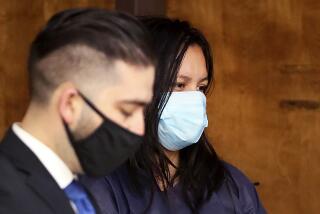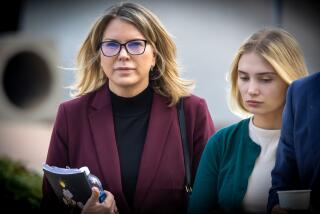Caro’s Frame of Mind Debated
- Share via
On the night Socorro Caro shot three of her young sons to death, she “was incapable of appreciating the nature and consequences of her actions,” a mental health expert for the defense testified Tuesday.
The testimony underscored attempts by Caro’s lawyers to portray her as so drunk and depressed on Nov. 22, 1999, that she could not have known what she was doing.
When the jurors who convicted her debate her punishment, they may view such impairment as a reason to spare her the death penalty and instead recommend life in prison without parole.
The prosecution, however, on Tuesday attacked the conclusions of Ventura neuropsychologist Ines Monguio, arguing Caro had clearly made choices that would be logical for a mother who sought to kill her children.
“Wouldn’t her choice of a .38-caliber revolver demonstrate that the defendant was capable of understanding the nature of her act?” Deputy Dist. Atty. Jim Ellison asked.
When Monguio asked in response if the handgun was the only weapon available, Ellison acidly countered, “Would it make a difference? The point is she didn’t pick up a broomstick or a fly swatter to kill her children.”
Ellison also reminded jurors that Caro shot each boy once in the head, pumping a second bullet into the skull of 5-year-old Christopher as he was squirming in his bed. The shootings reflected Caro’s deadly intent and her knowing ability to carry it out, he said.
Monguio’s testimony came on the sixth day of the trial’s penalty phase. Closing arguments are set for Thursday, when jurors grapple with the question of whether Caro should be executed. Convicted of first-degree murder on Nov. 5, the 44-year-old Santa Rosa Valley homemaker had unsuccessfully blamed her physician husband for her boys’ deaths and a gunshot wound to the head that nearly killed her.
On the witness stand all day, Monguio offered conclusions similar to those of a defense psychiatrist who testified Monday. Monguio said Caro was suffering a major depression with psychotic features, describing those as “a deterioration of contact with reality.”
As an example, she cited Caro’s belief she and her sons would be poverty-stricken if her husband, Dr. Xavier Caro, left her. Xavier Caro, an arthritis specialist, was conducting an affair suspected by his wife, and had conferred with a divorce lawyer weeks before the slayings.
Monguio interviewed Caro three times and gave her an extensive round of standardized psychological tests. She concluded the amnesia claimed by Caro was real, caused by her brain injury and a “dissociative” reaction that keeps her from recalling the violence that shattered her family.
Ellison tried to hammer away at Monguio’s credibility. Under his questioning, Monguio acknowledged she has never before appeared as an expert witness for prosecutors.
“You guys have no interest in what I have to say,” Monguio said.
Ellison also challenged the validity of the tests administered by Monguio, saying the Rorschach inkblot test has come under fire repeatedly.
Monguio said she was aware of the criticism but did not know about a 1999 study in which the Rorschach version she uses was said “to make normal adults and children seem maladjusted.”
Ellison said Caro “manipulated the outcome” of certain tests by lying. He cited, for instance, her test response indicating she thought her marriage was problem-free.
“She wasn’t being truthful with you, was she?” Ellison said.
“That’s not the same as lying,” Monguio contended, saying denial is one of Caro’s chronic symptoms.
Caro was a problem drinker, Monguio said, citing a tequila binge the night she shot her sons.
In response, the prosecution team--for the second day--brought up a scenario aimed at persuading jurors that Caro may not have been so impaired after all, despite a blood-alcohol reading nearly twice the legal limit for drunk driving.
“Did you ever consider the possibility,” Ellison asked, “that the defendant might have killed her children--and then drank the alcohol before she shot herself?”
Monguio replied she hadn’t. It was a scenario that hadn’t been raised during Caro’s trial.
More to Read
Sign up for Essential California
The most important California stories and recommendations in your inbox every morning.
You may occasionally receive promotional content from the Los Angeles Times.














